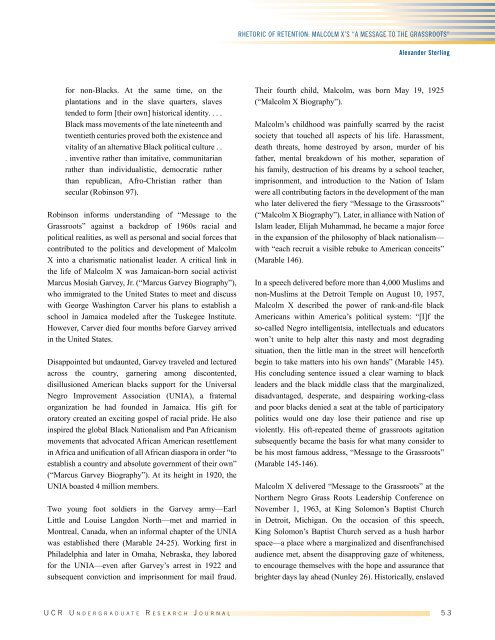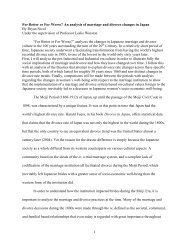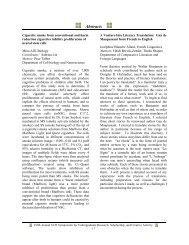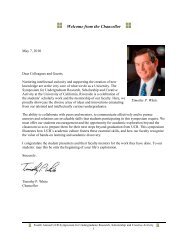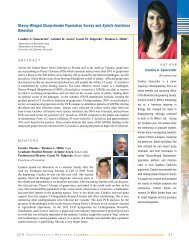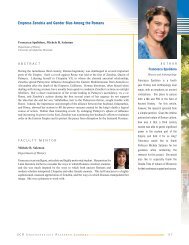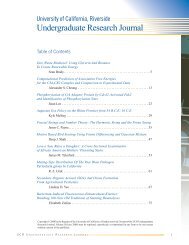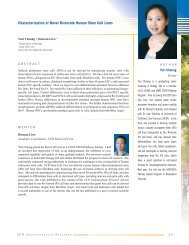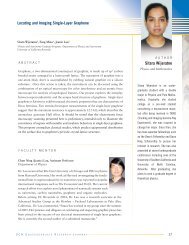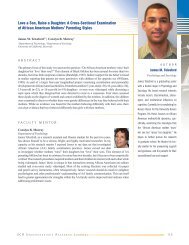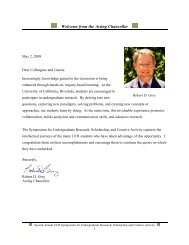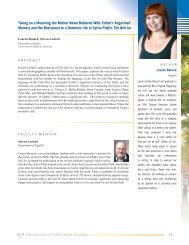Undergraduate Research Journal
Undergraduate Research Journal
Undergraduate Research Journal
You also want an ePaper? Increase the reach of your titles
YUMPU automatically turns print PDFs into web optimized ePapers that Google loves.
Rhetoric of Retention: Malcolm X’s “A Message to the Grassroots”<br />
Alexander Sterling<br />
for non-Blacks. At the same time, on the<br />
plantations and in the slave quarters, slaves<br />
tended to form [their own] historical identity. . . .<br />
Black mass movements of the late nineteenth and<br />
twentieth centuries proved both the existence and<br />
vitality of an alternative Black political culture . .<br />
. inventive rather than imitative, communitarian<br />
rather than individualistic, democratic rather<br />
than republican, Afro-Christian rather than<br />
secular (Robinson 97).<br />
Robinson informs understanding of “Message to the<br />
Grassroots” against a backdrop of 1960s racial and<br />
political realities, as well as personal and social forces that<br />
contributed to the politics and development of Malcolm<br />
X into a charismatic nationalist leader. A critical link in<br />
the life of Malcolm X was Jamaican-born social activist<br />
Marcus Mosiah Garvey, Jr. (“Marcus Garvey Biography”),<br />
who immigrated to the United States to meet and discuss<br />
with George Washington Carver his plans to establish a<br />
school in Jamaica modeled after the Tuskegee Institute.<br />
However, Carver died four months before Garvey arrived<br />
in the United States.<br />
Disappointed but undaunted, Garvey traveled and lectured<br />
across the country, garnering among discontented,<br />
disillusioned American blacks support for the Universal<br />
Negro Improvement Association (UNIA), a fraternal<br />
organization he had founded in Jamaica. His gift for<br />
oratory created an exciting gospel of racial pride. He also<br />
inspired the global Black Nationalism and Pan Africanism<br />
movements that advocated African American resettlement<br />
in Africa and unification of all African diaspora in order “to<br />
establish a country and absolute government of their own”<br />
(“Marcus Garvey Biography”). At its height in 1920, the<br />
UNIA boasted 4 million members.<br />
Two young foot soldiers in the Garvey army—Earl<br />
Little and Louise Langdon North—met and married in<br />
Montreal, Canada, when an informal chapter of the UNIA<br />
was established there (Marable 24-25). Working first in<br />
Philadelphia and later in Omaha, Nebraska, they labored<br />
for the UNIA—even after Garvey’s arrest in 1922 and<br />
subsequent conviction and imprisonment for mail fraud.<br />
Their fourth child, Malcolm, was born May 19, 1925<br />
(“Malcolm X Biography”).<br />
Malcolm’s childhood was painfully scarred by the racist<br />
society that touched all aspects of his life. Harassment,<br />
death threats, home destroyed by arson, murder of his<br />
father, mental breakdown of his mother, separation of<br />
his family, destruction of his dreams by a school teacher,<br />
imprisonment, and introduction to the Nation of Islam<br />
were all contributing factors in the development of the man<br />
who later delivered the fiery “Message to the Grassroots”<br />
(“Malcolm X Biography”). Later, in alliance with Nation of<br />
Islam leader, Elijah Muhammad, he became a major force<br />
in the expansion of the philosophy of black nationalism—<br />
with “each recruit a visible rebuke to American conceits”<br />
(Marable 146).<br />
In a speech delivered before more than 4,000 Muslims and<br />
non-Muslims at the Detroit Temple on August 10, 1957,<br />
Malcolm X described the power of rank-and-file black<br />
Americans within America’s political system: “[I]f the<br />
so-called Negro intelligentsia, intellectuals and educators<br />
won’t unite to help alter this nasty and most degrading<br />
situation, then the little man in the street will henceforth<br />
begin to take matters into his own hands” (Marable 145).<br />
His concluding sentence issued a clear warning to black<br />
leaders and the black middle class that the marginalized,<br />
disadvantaged, desperate, and despairing working-class<br />
and poor blacks denied a seat at the table of participatory<br />
politics would one day lose their patience and rise up<br />
violently. His oft-repeated theme of grassroots agitation<br />
subsequently became the basis for what many consider to<br />
be his most famous address, “Message to the Grassroots”<br />
(Marable 145-146).<br />
Malcolm X delivered “Message to the Grassroots” at the<br />
Northern Negro Grass Roots Leadership Conference on<br />
November 1, 1963, at King Solomon’s Baptist Church<br />
in Detroit, Michigan. On the occasion of this speech,<br />
King Solomon’s Baptist Church served as a hush harbor<br />
space—a place where a marginalized and disenfranchised<br />
audience met, absent the disapproving gaze of whiteness,<br />
to encourage themselves with the hope and assurance that<br />
brighter days lay ahead (Nunley 26). Historically, enslaved<br />
U C R U n d e r g r a d u a t e R e s e a r c h J o u r n a l 5 3


